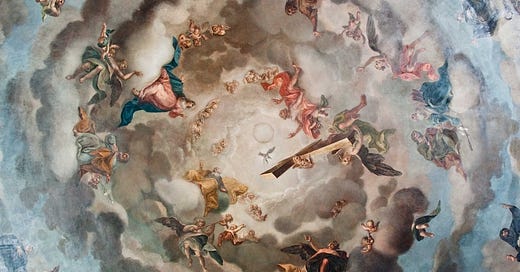The Catholic Church consistently appeals to human reason in teaching religious truths. As St. John Paul II noted, “Faith and reason are like two wings on which the human spirit rises to the contemplation of truth” (Fides et Ratio, 1998). However, reason alone cannot grasp the fullness of divine truth. Our reason, while a gift and an instrument, cannot save us.
The Compendium of the Catechism tells us that:
In coming to a knowledge of God by the light of reason alone man experiences many difficulties. Indeed, on his own he is unable to enter into the intimacy of the divine mystery. This is why he stands in need of being enlightened by God’s revelation, not only about those things that exceed his understanding, but also about those religious and moral truths which of themselves are not beyond the grasp of human reason, so that even in the present condition of the human race, they can be known by all with ease, with firm certainty and with no admixture of error (CCCC 4).
Ultimately, we must trust in divine Revelation—God’s transmission of the wondrous truths of salvation that he has communicated to us through His Church what is necessary for our salvation.
God’s Revelation in Christ
Revelation is God’s self-communication to humanity through creation, history, and most fully, in Jesus Christ. The Letter to the Hebrews affirms this: “In the past, God spoke to our ancestors through the prophets at many times and in various ways, but in these last days he has spoken to us by his Son” (Hebrews 1:1-2).
The Second Vatican Council affirmed this as well.
“In His goodness and wisdom God chose to reveal Himself and to make known to us the hidden purpose of His will… so that through Christ, the Word made flesh, men might in the Holy Spirit have access to the Father and come to share in the divine nature.” (Dei Verbum, 2)
This means that while nature and reason can point us toward God, true knowledge of Him and our eternal salvation comes through this direct revelation.
The Church as the Custodian of Divine Truth
The Church teaches everything necessary for understanding God because Christ entrusted His message to her. Jesus Himself declared, “He who hears you hears me” (Luke 10:16), affirming the Church’s role in teaching divine truth. St. Thomas Aquinas wrote,
“It was necessary for man’s salvation that there should be a knowledge revealed by God beyond philosophical science built up by human reason. Hence it was necessary for the salvation of man that certain truths which exceed human reason should be made known to him by divine revelation.” ST, I, q.1, a.1
St. Irenaeus reinforced this when he wrote, “Where the Church is, there also is God’s Spirit; where God’s Spirit is, there is the Church and all grace” (Against Heresies, III.24.1).
Scripture and Tradition: Two Pillars of Revelation
To ensure the transmission of divine truth, God has provided two complementary sources: Sacred Scripture and Apostolic Tradition. As the Catechism of the Catholic Church states, “Sacred Scripture and Sacred Tradition make up a single sacred deposit of the Word of God” (CCC 97). The Apostles, under the inspiration of the Holy Spirit, passed on Christ’s teachings to the early Church, ensuring that His message would not be lost. St. Paul emphasized this when he wrote, “So then, brethren, stand firm and hold to the traditions which you were taught, whether by word of mouth or by letter from us” (2 Thessalonians 2:15).
The Role of the Church in Preserving the Deposit of Faith
The Church has the responsibility of transmitting Revelation to every generation. Christ entrusted His teachings to the Apostles, and their successors—the bishops in union with the Pope—continue this mission. This teaching authority is what we call the Magisterium; it ensures our fidelity to Christ’s message. St. Augustine recognized this role when he said, “I would not believe the Gospel unless the authority of the Catholic Church moved me to do so” (Against the Fundamental Epistle of Manichaeus, 5.6).
The Inspiration and Authority of Sacred Scripture
Scripture is inspired by God and written for our salvation. As St. Peter affirms, “No prophecy of Scripture comes from one’s own interpretation… but men moved by the Holy Spirit spoke from God” (2 Peter 1:20-21). The Bible, while not meant to be read as a scientific or historical textbook, is entirely without error in matters of faith and morals and the ultimate truth of salvation. Pope Benedict XVI clarifies this, stating, “The aim of Scripture is not to convey scientific information but to teach us the way of salvation” (Verbum Domini, 2010).
Faith and reason work together, but Revelation surpasses human understanding. Grace elevates the human intellect to the contemplation of the glory of God, something we simply cannot do by our own natures. The Church, guided by the Holy Spirit, faithfully preserves and transmits God’s truth through Scripture and Tradition and this sacred Deposit of Faith ensures that each generation receives the fullness of God’s message, intact and incorrupt, until Christ’s return in glory.





